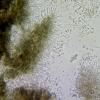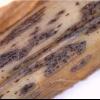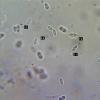
28-02-2026 14:43
A new refrence desired :Svanidze, T.V. (1984) Novy

01-03-2026 18:02
 Francois Guay
Francois Guay
I found this mystery Helotiales on an incubated le

01-03-2026 14:10
 Antonio Couceiro
Antonio Couceiro
Hola, me gustaria conocer opiniones sobre este tem

01-03-2026 18:46
 Robin Isaksson
Robin Isaksson
Hi! This species i se from time to time in the

01-03-2026 08:55
 Michel Hairaud
Michel Hairaud
Bonjour , Je souhaiterais recevoir cet article :�

01-03-2026 15:31
 Csaba Németh
Csaba Németh
Hello!I found these apothecia on Homalothecium lue

01-03-2026 17:51
 Bruno Coué
Bruno Coué
Bonjour,sur vieilles crottes de sanglier en chambr
Diaporthe pardalota?
Alan Smith,
14-02-2025 21:55
hello there, this host is a dead stem of Chamerion angustifolium and the fungus could possibly be Diaporthe pardalota due to the stained background and the surrounding black line. However, the spores are too small and are not septate. Could the spores possibly be of the smaller conidial stage which is said to be called Phomopsis convallariae (from fungi.myspecies.info)?
or possibly am I being too ambitious in search of a species!
merci à tous
Alan
Paul Cannon,
17-02-2025 11:40
Re : Diaporthe pardalota?
Yes, this is a Phomopsis, but assigning it to a species is really problematic. Molecular phylogenetic studies suggest that the old morphology-based classification is poor, but there are still many species and there isn't a good broad study that focuses on material on natural substrata. Suggest you simply identify as Phomopsis sp.
Best wishes
Paul
Alan Smith,
19-02-2025 21:26
Re : Diaporthe pardalota?
that's great, thank you Paul
Alan



